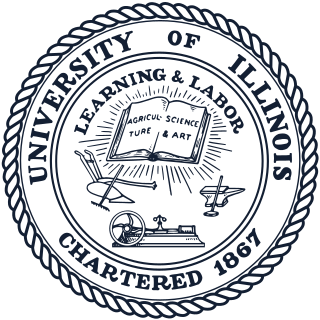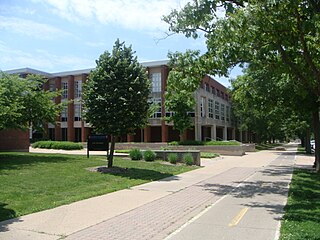Related Research Articles
The University of Toronto Faculty of Law is the law school of the University of Toronto. Maclean's has consistently assessed the Faculty as the highest ranked common law school in Canada and the highest ranked in terms of faculty journal citations. The Faculty offers the JD, LLM, SJD, MSL, and GPLLM degrees in law.

The University of Illinois Urbana-Champaign is a public land-grant research university in the Champaign–Urbana metropolitan area, Illinois, United States. It is the flagship institution of the University of Illinois system and was established in 1867. With over 59,000 students, the University of Illinois is one of the largest public universities by enrollment in the United States.
A Master of Laws is an advanced postgraduate academic degree, pursued by those either holding an undergraduate academic law degree, a professional law degree, or an undergraduate degree in a related subject. In most jurisdictions, the LL.M. is the advanced professional degree for those usually already admitted into legal practice.
A law degree is an academic degree conferred for studies in law.

Loyola University Chicago School of Law is the law school of Loyola University Chicago, in Illinois. Established in 1909, by the Society of Jesus, the Roman Catholic order of the Jesuits, the School of Law is located in downtown Chicago. Loyola University Chicago School of Law offers degrees and combined degree programs, including the Doctor of Juridical Science (S.J.D.).

The University of Michigan Law School is the law school of the University of Michigan, a public research university in Ann Arbor, Michigan. Founded in 1859, the school offers Master of Laws (LLM), Master of Comparative Law (MCL), Juris Doctor (JD), and Doctor of the Science of Law (SJD) degree programs.

The University of Virginia School of Law is the law school of the University of Virginia, a public research university in Charlottesville, Virginia.

The George Washington University Law School is the law school of George Washington University, in Washington, D.C. Established in 1865, GW Law is the oldest law school in the national capital. GW Law has 275 elective courses in business and finance law, environmental law, government procurement law, intellectual property law, international comparative law, litigation and dispute resolution, and national security and U.S. foreign relations law.
A Doctor of Juridical Science, or a Doctor of the Science of Law, is a research doctorate degree in law that is equivalent to the Doctor of Philosophy degree.

The American University Washington College of Law is the law school of American University, a private research university in Washington, D.C. It is located on the western side of Tenley Circle in the Tenleytown section of northwest Washington, D.C. The school is accredited by the American Bar Association and a member of the AALS.

Chicago-Kent College of Law is the law school of the Illinois Institute of Technology, a private research university in Chicago, Illinois. It is the second oldest law school in the state of Illinois.

Gies College of Business is the business school of the University of Illinois Urbana-Champaign, a public research university in Champaign, Illinois. The college offers undergraduate program, masters programs, and a PhD program. The college and its Department of Accountancy are separately accredited by AACSB International.

The University of Illinois College of Law is the law school of the University of Illinois Urbana-Champaign, a public land-grant research university in Champaign and Urbana, Illinois. It was established in 1897 and offers the Juris Doctor, Master of Laws, and Doctor of Juridical Science degrees.

The School of Information Sciences, also The iSchool at Illinois, is an undergraduate and graduate school at the University of Illinois Urbana–Champaign. Its Master of Science in Library and Information Science is currently accredited in full good standing by the American Library Association. The school is a charter member of the iSchool initiative.

The Washington University School of Law (WashULaw) is the law school of Washington University in St. Louis, a private research university in St. Louis, Missouri. Founded in 1867, the law school was originally located in downtown St. Louis, and relocated in 1904 to the Danforth Campus of Washington University in St. Louis.

The Labor and Employment Relations Association (LERA) was founded in 1947 as the Industrial Relations Research Association. LERA is an organization for professionals in industrial relations and human resources. Headquartered at the School of Labor and Employment Relations at the University of Illinois at Urbana–Champaign, the organization has more than 3,000 members at the national level and in its local chapters. LERA is a non-profit, non-partisan organization that draws its members from the ranks of academia, management, labor and "neutrals".

Fordham University School of Law is the law school of Fordham University. The school is located in Manhattan in New York City, and is one of eight ABA-approved law schools in that city. In 2013, 91% of the law school's first-time test takers passed the bar exam, placing the law schools' graduates as fifth-best at passing the New York bar exam among New York's 15 law schools.

Tulane University Law School is the law school of Tulane University. It is located on Tulane's Uptown campus in New Orleans, Louisiana. Established in 1847, it is the 12th oldest law school in the United States.

A Doctor of Law is a doctorate in legal studies.
References
- ↑ United States International Gambling® Report
- ↑ United States International Gaming® Report
- ↑ Research Eds. Dr. Dir., Gambling with Crime, Destablized Economies, and Financial Systems, U.S. International Gambling Report, (J. Kindt ed., William S. Hein & Co., Buffalo, N.Y., 2009)
- ↑ "John W. Kindt - College of Business > University of Illinois". University of Illinois at Urbana-Champaign. Archived from the original on 25 January 2013. Retrieved 12 February 2012.
- ↑ John W. Kindt, Marine Pollution and the Law of the Sea (1985, et seq.)